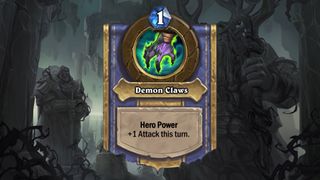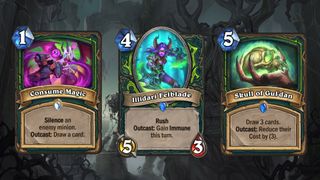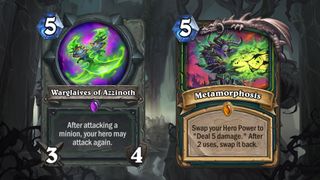It's fair to say, we were not prepared. Last month, a group of the best known Hearthstone pros, streamers, and assorted stragglers from the press (hello) gathered at a hotel near Blizzard's Irvine, California HQ to see a preview of this year's content. Having been to many such events, I've come to habitually joke "maybe they'll announce a new class", despite having long abandoned any hope. But this time, the lunatics only went and did it.
To audible gasps from the audience, Blizzard revealed that Hearthstone's next expansion, Ashes of Outland, will introduce the first new class since the game launched six years ago. According to Blizzard: "Hearthstone is ready for something new and exciting." The new class is Demon Hunter (sorry Monk mains) because that was the overwhelming choice of the development team.
The hero is, of course, Illidan Stormrage—WoW's most iconic Demon Hunter, now getting his chance to shine in Hearthstone, having previously been stuck as a trash tier neutral Legendary.
Immediately after the announcement I spoke with high profile players to get their reaction to Demon Hunter. You can read their thoughts here, but suffice to say that even Kripp seemed shook by the arrival of a day most of us had given up on seeing. We also got to play the new class for several hours, using multiple Demon Hunter decks and all the cards from Ashes to Outland. You've probably got some questions about how Demon Hunter works, what it feels like to play, and how you get your hands on the cards. I got you, so let's get into it.

What is the Demon Hunter hero power?
It's Demon Claws, which costs 1 Mana for +1 Attack for your hero. On paper, that sounds underwhelming—after all, Druid does the same thing but gets +1 Armor for an extra Mana. But do not be disappointed. Instead, pay particular attention to the cost. The fact that the Demon Hunter hero power only costs one makes it incredibly easy to weave into your turns. Also, this is most definitely a weapon-based class, with numerous spells and Battlecry effects that either juice your Illidan's attack or have a pay-off based on whether you used your hero power that turn. Finally, note that 'ping' effects are incredibly useful when it comes to generating board control in the early game (by picking off weak or damaged minions), which is exactly what Demon Hunter decks want to do before delivering the coup de grace to your opponent's face.
How many Demon Hunter cards are there?
One of the many perceived problems with creating a new class has always been how to fill in its Classic and Basic set. Blizzard has also had to account for the current number of cards available to other classes via expansions. The solution is elegant: Demon Hunter is being introduced alongside the annual set rotation, which is the time when the overall card pool is at its smallest. At launch on April 7, there will be 10 'Basic' Demon Hunter cards, plus an additional 20 'Initiate' Demon Hunter cards. These will be classified as belonging to the Year of the Dragon for the purposes of future set rotation.
Wait, how much is this new class going to cost?
The Basic and Initiate Demon Hunter cards are free to all players. On April 2 (five days before the new expansion drops) when you log in, everyone will be able to play four single-player missions that tell the origin story of Illidan Stormrage. The Ashes of Outland expansion will then add 15 further Demon Hunter cards on April 7, which will be opened from packs as usual, making for 45 Demon Hunter cards in total at launch. Thereafter, the remaining two expansions of the year will each contain another 15 new Demon Hunter cards, as opposed to the 10 which classes traditionally receive, helping bulk out your deck-building options.
The biggest gaming news, reviews and hardware deals
Keep up to date with the most important stories and the best deals, as picked by the PC Gamer team.

Aldrachi Warblades

Battlefiend

Blade Dance

Blur

Chaos Nova

Command the Illidari

Consume Magic

Coordinated Strike

Eye Beam

Feast of Souls

Flamereaper

Glaivebound Adept

Hulking Overfiend

Illidari Felblade

Illidari Satyr

Mana Burn

Metamorphosis

Raging Felscreamer

Satyr Overseer

Shadowhoof Slayer

Skull of Gul'dan

Soul Cleave

Twin Slice

Umberwing

Ur'zul Horror

Warglaives of Azzinoth

Wrathscale Naga

Wrathspike Brute
Will that be enough cards?
I think so. Obviously it's impossible to predict how any meta might play out with complete confidence, but Blizzard was keen to point out that although Demon Hunter presents as an aggressive class—thanks to its hero power and focus on weapons—it is possible to build multiple archetypes using the starting batch of cards. (Another example given was a deck that looked to cheat out big Demons.)
We'll get to how the class feels to play in a moment, but from the time I spent with the cards, it didn't feel like there was much 'pack filler'—i.e. cards that just make up the numbers but don't see a ton of serious play—in the Demon Hunter toolkit. Most of what's there looks playable, and if anything the pros thought that several of the cards were overtuned in terms of power.
How does it feel to play Demon Hunter?
The consensus opinion at the event was that Demon Hunter plays like a cross between Rogue—due to the weapon buffing and emphasis on sequencing the cards you play correctly—and Warlock, because you sometimes sacrifice your own minions and end up taking quite a bit of damage due to hitting stuff, but that can be healed back using Lifesteal effects. My take is that it's a fast, aggressive class, but hopefully not as one-dimensional as, say, Hunter tends to be. The coolest thing about Demon Hunter was the new Outcast mechanic, which gives it a very unique flavour.

How does Outcast work?
It's a new keyword that's exclusive to Demon Hunter in the same way that Combo is to Rogue. For an 'Outcast' effect to proc, you must play that card when it's positioned to the far left or right of your hand. That makes for some hectic turns in which you're trying to play cards in a very specific order so that Outcast triggers.
Some examples of Outcast effects include Consume Magic, which is a 1-Mana spell that reads: "Silence an enemy minion. Outcast: Draw a Card". As you can imagine, it's easier to manipulate fitting a cheap card like this into a specific sequence of plays. That gets trickier with more expensive ones, like Illidari Felblade. This is a 4-Mana minion whose text reads: "Rush. Outcast: Gain Immune this turn."
As you can see, Outcast effects are potent, and none more so than when they give Mana cost reductions. Check out the frankly insane Skull of Gul'dan. It's a 5-Mana spell that draws 3 cards. However, the text also reads: "Outcast: Reduce their cost by (3)." Mana cost reduction effects are scary at the best of times, and Demon Hunter has several of them that could help position the class as the new king of tempo.

Any more reasons to be excited about Demon Hunter?
Aside from the fact that it's a whole new freaking class? Sure, there's the Legendary minion which has the [redacted] keyword and is only creature in the game that can [redacted]. But we can't talk about that yet. We can talk about Warglaives of Azzinoth, a 5-Mana 3/4 weapon that reads "After attacking a minion, your hero may attack again". Almost any weapon is nutty in the Demon Hunter class thanks to the abundance of ways to buff its attack using spells and your hero power.
Speaking of fat damage, there's also Metamorphosis, a 5-Mana legendary spell that reads: "Swap your Hero Power to "Deal 5 Damage." After 2 uses, swap it back." It's a half-price Pyroblast that happens over two turns! The only thing to really worry about is how long the whole ladder will just be players trying Demon Hunter, and killjoys trying to counter them.
What are Demon Hunter's biggest weaknesses?
As with any high-tempo deck, you're going to be vulnerable to classes that are able to heal out of range. Of those pros I spoke with, several suggested that good ol' Control Warrior was the way to go. So I guess it's not all good news.
With over two decades covering videogames, Tim has been there from the beginning. In his case, that meant playing Elite in 'co-op' on a BBC Micro (one player uses the movement keys, the other shoots) until his parents finally caved and bought an Amstrad CPC 6128. These days, when not steering the good ship PC Gamer, Tim spends his time complaining that all Priest mains in Hearthstone are degenerates and raiding in Destiny 2. He's almost certainly doing one of these right now.

As Elder Scrolls: Legends shuts down, a mod delivers the perfect dedication to the rampers, aggros, mids, late gamers, invaders, ropers, comboers, and everyone else who loved it: 'Whoever you are: You are Legends'

After falling victim to the recent US TikTok ban, Marvel Snap switches to a new US-based publisher
Most Popular





